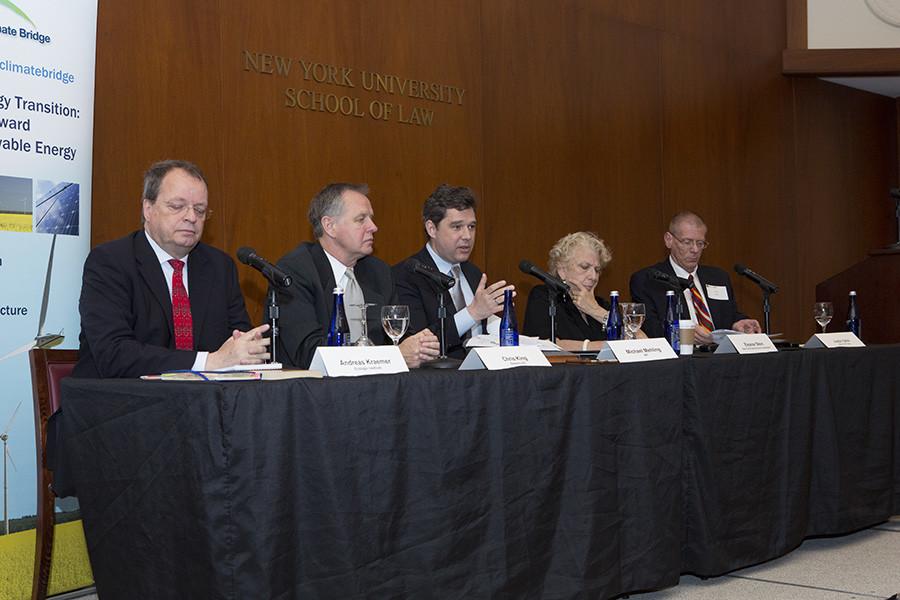Experts discuss carbon dioxide, renewable energy
Left to right: Andreas Kraemer, Chris King, Michael Mehling, Eleanor Stein and moderator Justin Gillis.
April 30, 2015
Leaders in the sustainable energy industry discussed New York State’s transition from relying on fossil fuels to implementing a renewable energy plan at a panel titled “The German Energy Transition: Debating Implications for New York State” hosted by NYU School of Law on Wednesday.
New York is developing a more environmentally conscious energy policy modeled after the German energy system Energiewende. The panel said a stable climate is essential for the growth of the world’s economies because the pollution’s high costs damage the environment and pressure businesses to go green.
Eleanor Stein, the administrative law judge of the New York State Public Service Commission, said there is an urgent need for an increase in renewable energy sources in New York. Stein said for the first time in history, the concentration of carbon dioxide in the atmosphere is at a record high.
“One of our greatest challenges impeding the clean energy transition is the level of investment magnitude that will be required to fully integrate renewable energy into the systems already in place,” Stein said. “We can no longer rely on bankers to carry the burden of funding these projects. We need new sources of investment if these policies are to be successful.”
Panelists looked to the Transatlantic Climate Bridge, a joint project platform between Germany and America, as a way to develop cleaner sources of energy and to create global solutions for climate change. Transatlantic Climate Bridge also plans to create new jobs, protect the climate, and produce affordable sources of energy.
Justin Gillis, an environmental reporter for the New York Times, said more countries are focusing on renewable energy as a way to relinquish dependencies on fossil fuels.
“The real question is how do we make this a success,” Gillis said. “In the United States we have the fortune to be able to look at what the Germans have done and gain the benefits of their solutions to climate problems.”
Michael Mehling, the executive director of the Center for Energy and Environmental Policy Research at Massachusetts Institute of Technology, said the opportunity for using clean energy sources in the United States is overwhelming.
“The United States is much more endowed with resources, including renewable resources, than Germany,” Mehling said. “If solar panels were used in all 50 states, the country could produce so much more energy with the same technology Germany uses.”
However, Andreas Kraemer, founder and director of the Ecologic Institute in Berlin, said he understands why people might fear the innovations in this sector. Kraemer said groundbreakers in this field need to focus on producing efficient and successful policies that will gain the community’s support.
“There are no problems, only challenges,” Kraemer said. “We need to attack them bit by bit and learn to go along with them. The idea is not to design the future perfect system, but to try things out on a small-scale level and learn from the failures and successes.”
Email Lexi Faunce at [email protected].




























































































































































